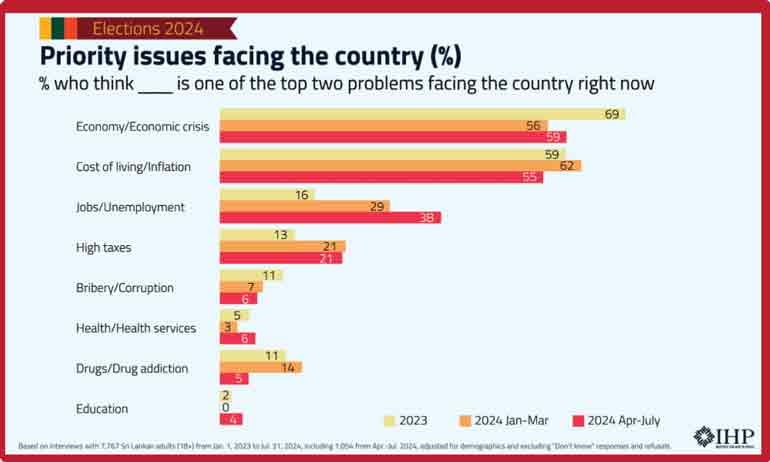Thursday Feb 19, 2026
Thursday Feb 19, 2026
Wednesday, 28 August 2024 00:40 - - {{hitsCtrl.values.hits}}

Sri Lankans overwhelmingly cite the economy and inflation as their biggest concerns going into the September Presidential Election in the latest IHP Sri Lanka Opinion Tracker Survey (SLOTS) polling during April to July 2024.
However, concerns about unemployment have been rising since the start of the year, whilst the numbers of Sri Lankans citing corruption and drugs as top national problems have been declining.
The SLOTS poll asked respondents to name the top two problems facing the country, with responses being unprompted. During April–July 2024, 59% named the economy (+3 points from Jan.–Mar. 2024) and 55% inflation (-7pts) as their top concerns. This was followed by 38% mentioning unemployment (+9pts) and 21% high taxes (-0.5pts). Smaller numbers of Sri Lankans cited corruption (6%), health (6%), drugs (5%), and education (4%) as in their top two concerns.
None of the over a thousand respondents cited the Presidential system, the constitution, or democracy as priority problems.
Whilst there is broad consensus that the economy is the most pressing national problem, better-off and poorer Sri Lankans differ in their perceptions about what is important. The least affluent third of Sri Lankans are more likely (69%) that the richest third (52%) to think the economy is a top priority. In contrast, poorer Sri Lankans are less likely (54%) than the better-off (63%) to cite inflation as a top problem. An even bigger contrast is seen with unemployment, which only one in five (18%) of poorest Sri Lankans cite as a top priority compared with one in two of the middle and most affluent Sri Lankans.
Economic issues and inflation are the top concerns across all age groups. Younger Sri
Lankans (18–29 years) are most concerned about inflation (60%), while concern about the economic crisis increases with age, reaching 67% among those aged 60 and older. Jobrelated concerns are most common among the younger population, but decrease with age.
IHP is an independent, non-partisan research centre based in Colombo, Sri Lanka. The SLOTS lead investigator is Dr Ravi Rannan-Eliya of IHP, who has trained in public opinion polling at Harvard University and has conducted numerous surveys over three decades.
SLOTS combines data from a national sample of adults (ages 18 and over) reached by random digit dialling of mobile numbers, and others coming from a national panel of respondents who were previously recruited through random selection. All estimates are weighted to be representative of the national population, including characteristics such as age, gender, province, sector, socioeconomic status, ethnicity and education.
The SLOTS survey has previously been funded by the Neelan Tiruchelvam Trust, the UK
National Institute for Health and Care Research (NIHR), The Asia Foundation in Sri Lanka, and others. Current field work is financed by the IHP Public Interest Research Fund and others. The sponsors play no role in the study design, analysis, or interpretation of findings.
The survey findings do not necessarily reflect the views or positions of past and present funders. Interested parties can contact IHP for more detailed data and results.